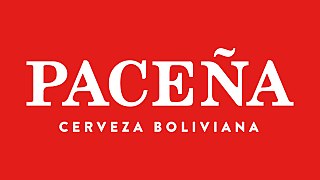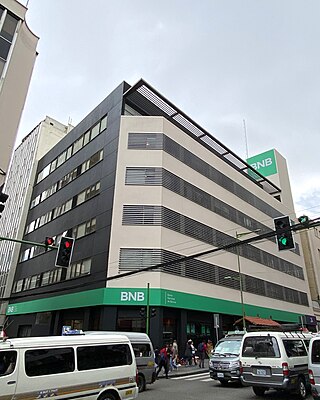Related Research Articles

Cochabamba is a city and municipality in central Bolivia in a valley in the Andes mountain range. It is the capital of the Cochabamba Department and the fourth largest city in Bolivia, with a population of 630,587 according to the 2012 Bolivian census. Its name is from a compound of the Quechua words qucha "lake" and pampa, "open plain." Residents of the city and the surrounding areas are commonly referred to as cochalas or, more formally, cochabambinos.

Repsol S.A. is a Spanish multinational energy and petrochemical company based in Madrid. It is engaged in worldwide upstream and downstream activities. In the 2022 Forbes Global 2000, Repsol was ranked as the 320th-largest public company in the world. As of 2022, it has 24,000 employees worldwide.
UNITEL is a Bolivian commercial television network headquartered in Santa Cruz de la Sierra, Bolivia. It was founded in 1987 in Santa Cruz de la Sierra as Teleoriente, which in 1997 created the current network and bought two Telesistema Boliviano stations. It is owned by businessman Osvaldo Monasterio Nieme. The company broadcasts sports, entertainment, political programs, and daily news programs nationwide in the South American country.

Grupo Arcor is an Argentine food company specialized in confectionery. The firm was founded on July 5, 1951 in the city of Arroyito, Córdoba. It specializes in the production of foodstuff, sugar and chocolate confectionery, cookies and ice cream in 39 industrial plants throughout Latin America. It is the world's top producer of hard candies and the tenth-biggest confectionery manufacturer overall. In Argentina, Arcor is the largest producer of processed foods, and its products are exported to over 120 countries.

The Bolivian Army is the land force branch of the Armed Forces of Bolivia. Figures on the size and composition of the Bolivian army vary considerably, with little official data available. It is estimated that the army has between 26,000 and 60,000 men.
Bolivia's drinking water and sanitation coverage has greatly improved since 1990 due to a considerable increase in sectoral investment. However, the country continues to suffer from what happens to be the continent's lowest coverage levels and from low quality of services. Political and institutional instability have contributed to the weakening of the sector's institutions at the national and local levels. Two concessions to foreign private companies in two of the three largest cities—Cochabamba and La Paz/El Alto—were prematurely ended in 2000 and 2006 respectively. The country's second largest city, Santa Cruz de la Sierra, relatively successfully manages its own water and sanitation system by way of cooperatives. The government of Evo Morales intends to strengthen citizen participation within the sector. Increasing coverage requires a substantial increase of investment financing.

Abengoa, S.A. was a Spanish multinational company in the green infrastructure, energy and water sectors. The company was founded in 1941 by Javier Benjumea Puigcerver and José Manuel Abaurre Fernández-Pasalagua, and was based in Seville, Spain. Its current chairman is Gonzalo Urquijo Fernández de Araoz. After repeated bankruptcies and rescues, it declared insolvency in February 2021 amid various regulatory and financial charges against the board and management, the second-largest corporate collapse in Spanish history.
Alicorp is the largest Peruvian consumer goods company, with operations in South America.

The electricity sector in Bolivia is dominated by the state-owned ENDE Corporation, although the private Bolivian Power Company is also a major producer of electricity. ENDE had been unbundled into generation, transmission and distribution and privatized in the 1990s, but most of the sector was re-nationalized in 2010 (generation) and 2012.
Red Eléctrica de España is a partly state-owned and public limited Spanish corporation which operates the national electricity grid in Spain, where it operates the national power transmission system. It also holds assets in Peru, Chile and Brazil.

Totora, Tutura or T'utura is a town in the Carrasco Province of the Cochabamba Department in Bolivia. It is the capital and most-populous place of the Totora Municipality. As of the 2012 census, the population is 1,925. The first settlers were the Inca. Totora was officially settled in 1876, and declared a town by the Government of Bolivia in 1894.
Red UNO de Bolivia is a national Bolivian television network owned by businessman Ivo Kuljis. It started operations in April 1984 in Santa Cruz and in 1985 in La Paz. Its most notable programming is Notivisión (news) and "El Mañanero ". It also maintains affiliation deals with three channels in Potosí, Sucre and Tarija.

Paceña is a Bolivian beer produced in La Paz, hence its name that means "the one of La Paz". The beer is produced by CBN, an AB InBev company that dates back to 1877 and that controls 80% percent of the Bolivian beer market. Paceña is made at about 3,600 meters above sea level with purified water from the Andes.

Acesur is a leading company within the olive oil sector in Spain, with 100% Spanish capital share and among the top five in the international market. Its activities revolve around the production, refining, bottling, marketing and exportation of olive and vegetable oil as well as olives, vinegars, sauces, mayonnaises and condiments. It owns brands known as "La Española", "Coosur", and "Al Amir". Acesur has received prizes such as the Aster award.

Banco Nacional de BoliviaS.A. (BNB) (English: National Bank of Bolivia) is a Bolivian bank and financial institution headquartered in Sucre, Bolivia. Founded in 1871, it is one of Bolivia's oldest banks. It is also the country's second largest bank by total assets.
Zote is a Mexican company primarily known for its laundry soap. The soap is popular for hand washing clothes and pretreating oily stains.
The automotive industry in Argentina is the third largest in Latin America, driving 3% of Argentina’s GDP, 10% of industrial production, and 10% of exports in 2023. With a dozen global multinationals and over 200 auto parts companies operating in the country, Argentina's automotive sector is a sophisticated and technologically advanced industry. Automakers rely on Argentina as a regional production hub for Latin America and export over USD $8 billion annually in passenger vehicles, light and heavy commercial vehicles, trucks, motorcycles, and parts primarily to Brazil, Chile, Colombia, Peru, and Central America. Given the popularity of light-duty trucks among Argentine consumers, Argentina is the world's fourth largest producer of pickup trucks; top pickup brands produced in Argentina include the Toyota Hilux, Ford Ranger, Nissan Frontier, and Volkswagen Amarok.

Citroën Argentina S.A. was the Argentine subsidiary of French automotive manufacturer Citroën which produced vehicles of the brand in the country. Established in 1959 and headquartered in Barracas, Buenos Aires, it operated in the country for 30 years producing vehicles until the economic crisis during the military government reorganisation process forced the company to cease its operations.
The Cement Industry in Bolivia refers to the production, sale and consumption of cement in the country since according to the latest official data from the National Institute of Statistics of Bolivia, the country had a production of around 3.8 million metric tons of cement during the year 2022. In Bolivia there are five large Bolivian companies that produce cement, which are: SOBOCE, FANCESA, COBOCE, ITACAMBA, and ECEBOL.
Industrias Quantum Motors SA is a vehicle manufacturing company based in Cochabamba, Bolivia and founded by José Carlos Márquez and Carlos Suroco Deiters in 2017. The company originally made mini electric dump trucks for the mining industry. It also makes motorcycles and bicycles.
References
- 1 2 3 4 "Company Overview of Industrias de Aceite S.A." Bloomberg . Retrieved December 29, 2017.
- 1 2 3 4 5 "Pioneros del Sector Oleaginoso en Bolivia" (in Spanish). FINO. Retrieved December 29, 2017.
- 1 2 3 Ross, Robert L. (2000). Mission Possible: The Story of the Latin American Agribusiness Development Corporation (LAAD) . Transaction Publishers. p. 90. ISBN 0765800357 . Retrieved December 29, 2017.
Industrias de Aceite bolivia oil production.
- ↑ "Alicorp compra industrias Fino por $us 292 millones | EL DEBER". eldeber.com.bo (in Spanish). Retrieved 2020-07-13.
- ↑ "Marcas Propias" (in Spanish). FINO. Retrieved December 29, 2017.
- ↑ "Marcas Distribuidas" (in Spanish). FINO. Retrieved December 29, 2017.